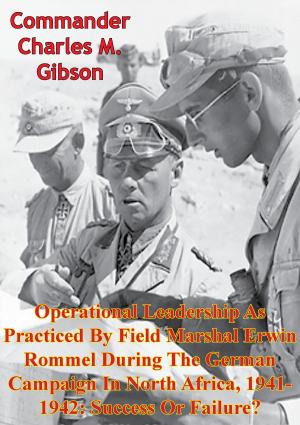Orde Wingate And The British Internal Security Strategy During The Arab Rebellion In Palestine, 1936-1939
Nonfiction, History, Germany, European General, Military, United States| Author: | Major Mark D. Lehenbauer | ISBN: | 9781782894421 |
| Publisher: | Lucknow Books | Publication: | August 15, 2014 |
| Imprint: | Lucknow Books | Language: | English |
| Author: | Major Mark D. Lehenbauer |
| ISBN: | 9781782894421 |
| Publisher: | Lucknow Books |
| Publication: | August 15, 2014 |
| Imprint: | Lucknow Books |
| Language: | English |
The Arab Rebellion and British Counter-rebellion campaign of 1936 to 1939 in Palestine exhibited many features of modern insurgency and counterinsurgency. This thesis traces the British military thought and practice for countering rebellion as influenced by their Small Wars’ experiences, and it then presents the rebellion and counter-rebellion campaign as a case study in their military and political contexts. This study focuses on the evolution of the internal security strategy, and it examines the actions of Captain Orde Wingate both within the campaign and in his attempts to influence it at the tactical, operational, and strategic levels. This research is intended to inform military practitioners about the campaign while highlighting the issues that are encountered when they seek to: (1) apply the contemporary wisdom of military thought and practice to a specific operational environment; (2) negotiate the policy constraints on the possible military “solutions” to the security problems incurred by insurgency; (3) influence various facets of the greater campaign when outside the hierarchy of responsibility and authority to do so; and (4) expose some of the issues involved with a counterinsurgent force’s utilization of portions of the indigenous population toward converging interests. This study finds that Wingate sought to shape the evolving internal security strategy through both military and political channels, and that he utilized a variety of mechanisms to do so. Despite tactical successes in his validation of proofs of concept through the Special Night Squads, his determined efforts failed to achieve his stated goals at the operational and strategic levels.
The Arab Rebellion and British Counter-rebellion campaign of 1936 to 1939 in Palestine exhibited many features of modern insurgency and counterinsurgency. This thesis traces the British military thought and practice for countering rebellion as influenced by their Small Wars’ experiences, and it then presents the rebellion and counter-rebellion campaign as a case study in their military and political contexts. This study focuses on the evolution of the internal security strategy, and it examines the actions of Captain Orde Wingate both within the campaign and in his attempts to influence it at the tactical, operational, and strategic levels. This research is intended to inform military practitioners about the campaign while highlighting the issues that are encountered when they seek to: (1) apply the contemporary wisdom of military thought and practice to a specific operational environment; (2) negotiate the policy constraints on the possible military “solutions” to the security problems incurred by insurgency; (3) influence various facets of the greater campaign when outside the hierarchy of responsibility and authority to do so; and (4) expose some of the issues involved with a counterinsurgent force’s utilization of portions of the indigenous population toward converging interests. This study finds that Wingate sought to shape the evolving internal security strategy through both military and political channels, and that he utilized a variety of mechanisms to do so. Despite tactical successes in his validation of proofs of concept through the Special Night Squads, his determined efforts failed to achieve his stated goals at the operational and strategic levels.








![Cover of the book Official History of the Royal Air Force 1935-1945 — Vol. I —Fight at Odds [Illustrated Edition] by Major Mark D. Lehenbauer](https://www.kuoky.com/images/2014/august/300x300/9781782893417-2YpY_300x.jpg)
![Cover of the book NILE TO ALEPPO: With The Light-Horse In The Middle East [Illustrated Edition] by Major Mark D. Lehenbauer](https://www.kuoky.com/images/2014/august/300x300/9781782895657-U3q9_300x.jpg)
![Cover of the book Sir Douglas Haig's Despatches (December 1915-April 1919) [Illustrated] by Major Mark D. Lehenbauer](https://www.kuoky.com/images/2012/april/300x300/9781782890829-k6SN_300x.jpg)


![Cover of the book The First World War, 1914-1918; Personal Experiences Of Lieut.-Col. C. À Court Repington Vol. II [Illustrated Edition] by Major Mark D. Lehenbauer](https://www.kuoky.com/images/2015/november/300x300/9781786250940-ceH8_300x.jpg)

